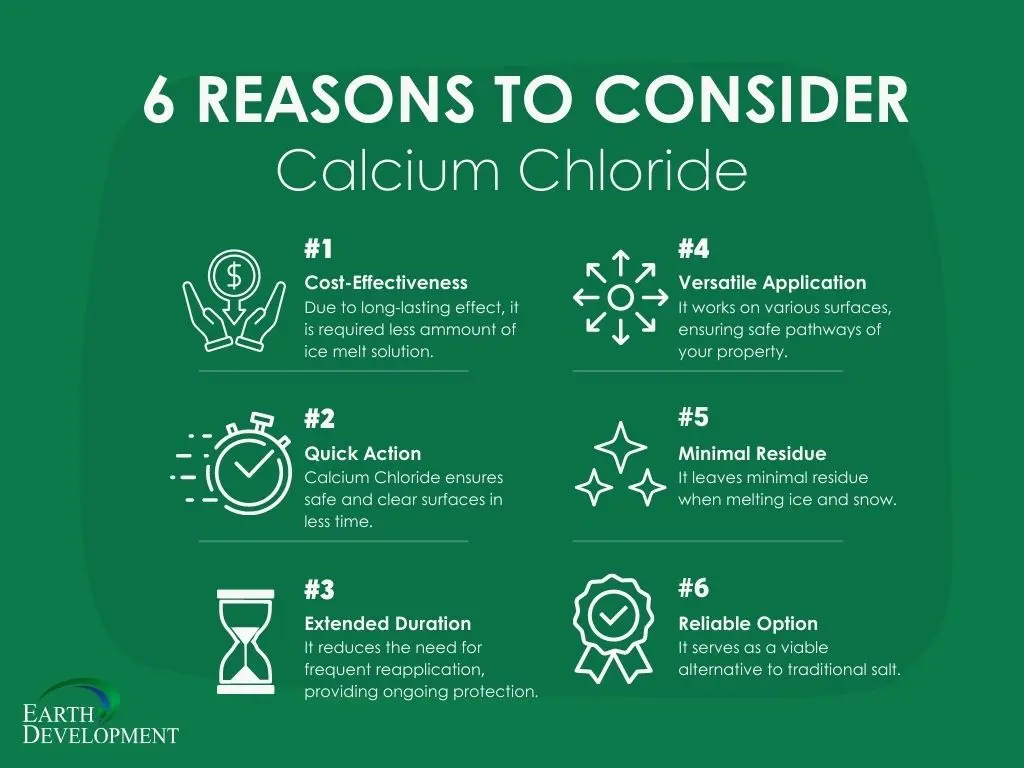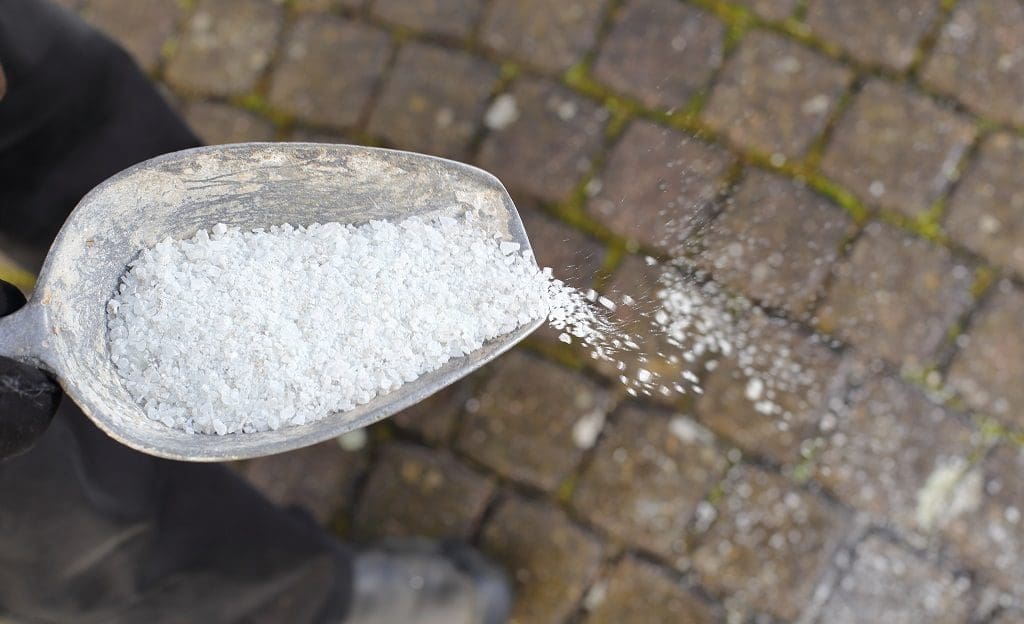Calcium chloride is one of the most popular deicing agents used by snow removal and ice management experts globally. It works similarly to sodium chloride, or rock salt, but offers some key benefits that combat ice buildup. For example, calcium chloride can melt ice at lower temperatures and pose less of a risk to plant life.
As with all deicing agents, however, there are questions to be answered about safety. Every company taking steps to prevent snow build-up and ice formation on their property should understand the properties of the deicing agents used and any potential safety issues they might present.
At Earth Development, we provide businesses throughout the Midwest with reliable and rofessional deicing and snow removal services, but we also aim to provide valuable information for readers on our site.
What Is Calcium Chloride?

Calcium chloride is a chemical compound that’s made from calcium and chlorine ions. It’s typically available in the form of a white crystalline powder or pellets. Here are some key aspects of calcium chloride:
- Calcium chloride is a hygroscopic substance, which means it can absorb moisture from the air.
- It has a strong affinity for water and readily dissolves in it.
- Calcium chloride has a high melting point and is often used in its solid form for various applications.
- It’s highly soluble in water, which makes it effective for snow and ice removal.
Common Uses and Applications
- Snow and Ice Removal: Calcium chloride is widely used as a deicer for clearing snow and ice from roads, walkways, and parking lots. Its ability to lower the freezing point of water allows it to melt ice quickly.
- Dust Control: Calcium chloride is also used to suppress dust on unpaved roads and construction sites. When applied to the surface, it attracts moisture from the air and prevents dust particles from becoming airborne.
- Industrial Applications: Calcium chloride is used in various industrial processes including food processing, oil and gas drilling, and concrete curing. It’s used as a drying agent, antifreeze, and additive in chemical reactions.
- Water Treatment: The compound is used in water treatment facilities to adjust the calcium hardness levels and maintain the proper balance in swimming pools and hot tubs.
- Agriculture: Calcium chloride is sometimes used in agriculture to provide plants with essential nutrients and to improve soil structure.
These are only a few examples of the many uses and applications of calcium chloride. Its versatility and effectiveness make it a popular choice in various industries and settings.
How Does Calcium Chloride Work?
Calcium chloride works by lowering the freezing point of water through a process called freezing point depression. When calcium chloride comes into direct contact with ice or snow, it dissolves in the moisture present and forms a brine solution. This brine solution has a lower freezing point than pure water, which causes the ice to melt.
6 Reasons to Consider Calcium Chloride Ice Melt for Deicing on Commercial Property

1.Cost Effective Ice Melt for Commercial Facilities
Calcium chloride is a cost-effective ice melt option for commercial facilities. With its high melting power, it requires less material to effectively melt large quantities of ice and snow. Plus, the longevity of its effects reduces the reapplication rate to help save money in the long term. By considering calcium chloride as an ice melt solution, commercial facilities can achieve efficient ice and snow removal while being mindful of their budget.
2. Quick Action
Calcium chloride starts working immediately upon contact with ice and snow, penetrating through the frozen layers and accelerating the melting process. This quick action ensures prompt results, allowing for safe and clear surfaces in a shorter amount of time.
3. Extended Duration
One advantage of calcium chloride is its ability to provide long-lasting effects. It continues to actively melt ice and snow even after the initial application, creating a protective barrier that helps prevent ice from re-forming. This extended duration reduces the need for frequent reapplication and provides ongoing protection against slippery conditions.
4. Versatile Application
Calcium chloride is suitable for various surfaces, including concrete, asphalt, and pavers. Its versatility makes it an excellent choice for deicing parking lots, walkways, and other commercial areas. Regardless of the surface material, Calcium chloride effectively melts ice and snow and ensures safe and accessible pathways for employees, customers, and visitors.
5. Minimal Residue
When calcium chloride melts ice and snow, it leaves behind minimal residue. This means that once the ice has melted, there’s less slush or leftover material on the ground. The minimal residue helps maintain the cleanliness of your property and reduces the need for extensive cleaning and minimizing potential environmental impacts.
6. Good Option to Use During Salt Shortage
During salt shortages, calcium chloride emerges as a reliable option for ice melt as it can be easier to find calcium chloride. Its effectiveness at lower temperatures makes it suitable for extreme winter conditions when traditional salt may not suffice. Calcium chloride provides a viable alternative to mitigate the impact of salt shortages, ensuring that commercial properties can maintain safe conditions for employees, customers, and visitors even in challenging circumstances.
Is Calcium Chloride Safe for Your Property?

Potential Effects on Concrete and Surfaces
Calcium chloride can have some potential effects on concrete and other surfaces. It’s a highly effective ice melt agent, but if it’s used excessively or used on concrete that’s in poor condition, it can cause damage. It may contribute to the deterioration of concrete over time, leading to cracks and spalling. It’s important to use calcium chloride in moderation and follow recommended application rates to minimize potential damage.
Environmental Considerations
While calcium chloride is generally considered safe for the environment, you should be mindful of its impact. Excessive use or runoff of calcium chloride can potentially harm vegetation and nearby water bodies. To minimize environmental impact, follow recommended application rates, avoid over-application, and consider environmentally friendly alternatives when possible.
Best Practices for Minimizing Potential Damage
To minimize potential damage to your property, consider the following best practices when using calcium chloride:
- Apply calcium chloride in moderation, following recommended application rates.
- Avoid using excessive amounts, especially on vulnerable surfaces.
- Promptly remove excess calcium chloride residues after snow and ice melting.
- Regularly inspect your property for any signs of damage and address them promptly.
Does Calcium Chloride Pose a Risk to Humans and Animals?
Calcium chloride is often used in food, though in small quantities. It’s a compound that’s perfectly safe for human consumption and helps food keep its color while adding a salty flavor. The compound is also often found in bottled waters, meaning it technically poses no risk to human or animal life.
This may change depending on how much you use and there are some risks when handling calcium chloride. Pure calcium chloride can burn or irritate the skin, which is why professional snow removal experts are a fantastic investment during the winter. Touching calcium chloride that’s been applied to your outdoor surfaces may cause unpleasant irritation, so it’s always best to avoid doing that and to use the substance with caution.
So Should I Use Calcium Chloride on My Property?

Sure! Calcium chloride is hugely popular, particularly with businesses in parts of the country that see temperatures drop well below freezing.
Sometimes, a mixture of calcium chloride and sodium chloride is a great option, too. It provides all the benefits of calcium chloride with the affordability advantage of sodium chloride.
If you still have questions about which agent is right for you, asking local snow removal experts like our team at Earth Development is recommended.
Trust Snow Removal Experts with a Range of Deicing Agents
When you’re choosing a snow removal company, always check to see the kinds of deicing agents they use. There’s no one-size-fits-all solution, which is why our Earth Development teams across the Midwest and beyond provide custom plans for every customer.
For the highest quality service, choose a snow removal company with the highest quality and safest ingredients.
Call us today and we’ll happily talk to you about your needs, connect you with our local experts, and offer you a free quote!
